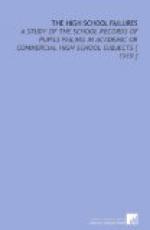There is apparently no constitutional impediment to a still further extension of the principle of flexibility and to the minimizing of loss by what has been a costly trial and error method of fitting the pupils and the subjects to each other. Short unit courses are not unfamiliar in certain educational fields, and they lend themselves very readily to definite and specific needs. Their usefulness may be regarded as a warrant of a wider adoption of them. Although they are as yet employed mainly for an intensive form of training or instruction to meet specific needs of a particular group in a limited time,[60] the principle of their use is no longer novel. A unit course of an extensive nature is also conceivable, for instance, a semester of any subject entitled to two credits might allow a division into two approximately equal portions. If then both teacher and pupil feel, when one unit is completed, that the pupil is in the wrong subject or that his work is hopeless in that subject, he might be permitted to withdraw and be charged with a failure of only one point, that is, just one-half the failure of a semester’s work in the subject—or one-fourth that for a whole year with no semester divisions. Even if this scheme would not work equally well in all subjects, it implies no extensive reorganization to employ it in the ones adapted. It is not incredible that, as the people more generally understand that physics, chemistry, and biology have become vital to national self-preservation and social well-being, their emphasis as subjects required or as subjects sought by most of the pupils may lead to a high percentage of failures, such as is found for Latin and mathematics usually,




